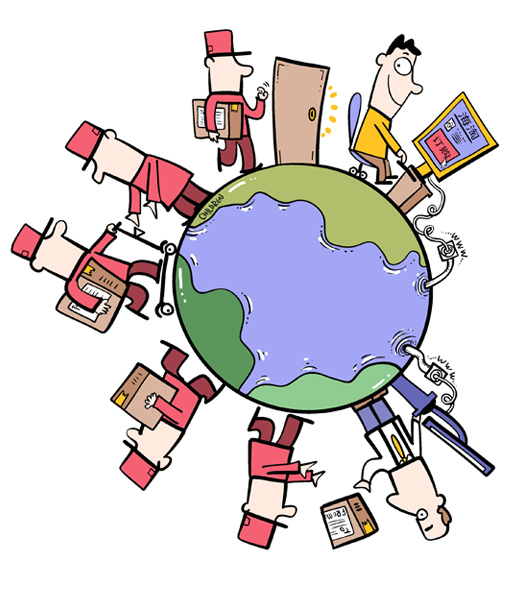New strategy to spur China’s economy

Buying overseas goods online, also known as haitao, has become increasingly common as cross-border e-commerce booms in China.The Ministry of Commerce forecasts that China’s cross-border trade by e-commerce companies will be worth 6.5 trillion yuan ($1.05 trillion) in 2016.
China officially gained access to the Internet on April 20, 1994. Over the past two decades, the Internet has brought profound changes to people’s lives and become a powerful driving force behind China’s economy. The new notion of Internet Plus mentioned in this year’s government work report has become a hot topic discussed at different occasions, with its aim to push the country’s economy to a higher level.
Included into top design
The notion was first brought up by Tencent CEO Ma Huateng, also known as Pony Ma, who said: “What does the Internet plus a traditional industry mean? It means a capability or a kind of external resource and environment that is necessary to upgrade the traditional industry.”
Chinese Premier Li Keqiang referred to Internet Plus in his government work report in March, saying that China would develop an action plan to integrate mobile Internet, cloud computing, big data and the Internet of Things with modern manufacturing. This will foster healthy development of e-commerce, industrial networks and Internet banking, Li said, while helping Internet companies increase their international presence.
The Internet has penetrated many fields, including healthcare, education, transportation and finance, and upgraded numerous traditional industries.
For example, instant messaging comprises the Internet plus communication; e-commerce comprises the Internet plus retailing; online media comprises the Internet plus news; taxi apps Didi and Kuaidi comprise the Internet plus transportation; and the third-party online payment arm of Chinese e-commerce giant Alibaba Group Alipay comprises the Internet plus banking.
‘Chemical reaction’ proceeds
Some experts and scholars pointed out that Internet Plus should be a “chemical reaction” rather than a “physical” one involving the simple addition of the Internet and traditional industries. Yang Peifang, president of the China Information Economics Society, explained that the term “chemical reaction” is a metaphor for the Internet transforming the production mode, economic model and industrial structure of traditional industries.
The development of the iron and steel industry is a typical case. The application of the Internet in this traditional industry started in 2008, when it only fulfilled a marketing channel. Starting last year, the industry has begun to realize the virtue of Internet Plus.
“In the iron and steel industry, the Internet not only provides a platform for warehouse management but also offers financial services, realizing the integration of the whole industrial chain,” said Huang Lihua, a professor from the School of Management at Fudan University.
In addition to overall integration, the Internet has also transformed traditional industries, from the sales section up to the production chain.
Agriculture, which seemingly has minimal synergy with the online world, has also been influenced by the Internet. Currently, the Ministry of Commerce is formulating guidelines for accelerating the development of e-commerce in the countryside with related departments. Many enterprises have also been engaged in the e-commerce of agricultural materials, Internet banking in the countryside and agricultural informatization. Other uses of the Internet in agriculture include planting, processing, transportation and sales.
However, there are still some fields that the Internet has yet to influence. Chen Xinhe, an expert from the Electronic Technology Information Research Institute under the Ministry of Industry and Information Technology, said that Internet Plus has been applied into some fields with weak technology in China, especially the service sector.
Removing institutional obstacles
Lü Benfu, a professor from the School of Management at the University of Chinese Academy of Sciences in Beijing, said that Internet Plus is user-oriented rather than production-oriented. “It requires re-exploring the habits of consumers, recombining core technology and fully utilizing the country’s demographic dividends in relation to the Internet, all of which contribute to the Chinese development path of the Internet Plus strategy,” Lü said.
According to data released by the China Internet Network Information Center, China had 649 million Internet users at the end of 2014, including 361 million e-shopping users. This undoubtedly provides a huge consumer market for the implementation of the Internet Plus strategy. In addition, other practical conditions, including cheaper mobile terminal devices and easier access to the Internet, also promote the development of the Internet.
There are also some institutional obstacles, including the lack of policies for information mobilization, data sharing and purchasing cloud services. The government has been endeavoring to remove these institutional obstacles.
In addition to supportive institutions, other conditions are also required to develop Internet Plus. Ouyang Rihui, deputy dean of the Institute of Internet Economy at the Central University of Finance and Economics, suggested that the government should pay more attention to infrastructure construction.
“It is necessary to formulate the national strategy of cloud computing and big data as soon as possible,” said Gao Hongbing, director of the Policy Center of Alibaba Group.
(Edited and Translated from People’s Daily)
